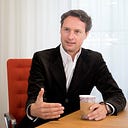OF THE EXISTENTIAL VOID OF FAITH AND HOPE IN A MODERN WORLD
Pope Benedict suggested that: “The postmodern assault on truth is pursued under the semblance of freedom, but it becomes a prison for each one, for it separates people from one another, locking each person into his or her own ego.”
Undoubtedly, the late Pope is controversial for many, as a person and in his role. However, I believe, his passing, together with the death of other “iconic” figures symbolically representing both old and new “religions” — invites us to a stimulating reflection: what is the place of faith and hope in our postmodern society?
Faith is sometimes defined as the combination of intellectual agreement, and trust. A “chair” is often used to illustrate this: intellectual assent is recognizing that a chair is a chair; trust is actually sitting in the chair, reliant on it being (well-)designed to support us whilst sitting on it. The proverbial “leap of faith” implies both vulnerability of exposure and enactment in accordance with a deeply held system of belief.
James Fowler once defined faith as the “universal quality of human meaning making” — used by all people regardless of their (religious)
beliefs. Faith, he suggested, occurs as individuals place personal confidence and loyalty in one or more “centres of value” — be that religion, (royal) family, (capitalism and) money, sports, or others — that help to situate our “self” within a meaningful cosmos.
In Christianity, faith is closely related to hope. Hope, is our reasonable confidence in a specific future — more than just a wish. Faith includes hope, but is not only future-oriented; it provides deeper orientation and relatedness, in a significant way.
In psychology, hope is often defined as motivational energy derived from our agency to attain a goal through a specific path. Hence, we might argue that faith provides direction whilst hope generates momentum. Therefore, meaningful transformation might indeed require both.
Today, traditional and novel “centres of value” are in deep crisis. Organised religion is haunted by scandals and its hubristic clinging to absolutist power; worldly “absolutism” has long entered a stage of irrelevance and ridicule; new “unholy religions” like football have become symbols of corruption and human pettiness; and the “spirit of capitalism” has transmuted from hopeful “glasnost” into the unsustainable and arrogant irresponsibility of global capitalism…
Why is that a problem? Faith enables us not only to transform individually —but to seek and embrace transcendental and universal ethical values as a society: ‘How can humans be wonderful?’, asked the humanists of the past. Thus, the real menace of the 21st century, quipped Benedict, is not religion but a ‘dictatorship of relativism’. Devoid of epistemological truth and societal faith, the category of “good” disappears — humanity loses its ability to act collectively for a greater common good…
Post-truth and post-faith, our modern “realists” proudly challenge: ‘why is man so rotten?’ — oblivious that the grimacing phantom in the mirror is not the face of freedom, but despair…
Thanks to the many great comments and conversations on LinkedIn — to be updated here soon.
A special thanks to Bill Durodie for his stimulating thoughts that led to this (updated) reflection. Here, the article Bill shared and upon which I am trying to build: https://www.spiked-online.com/2022/12/31/pope-benedict-vs-the-calculating-elites/
